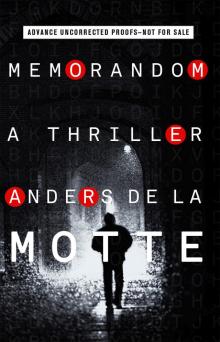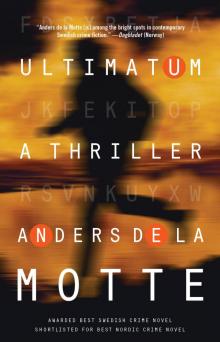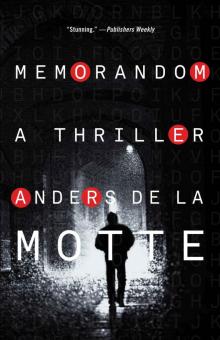- Home
- Anders de la Motte
MemoRandom Page 11
MemoRandom Read online
Page 11
The stench was even worse in the kitchen. The draining board was overflowing with dirty dishes, and on the stove was a plastic container with the remains of a ready meal that was furry with mold. There were more improvised ashtrays in there, and a bucket that stank like hell. But he didn’t smoke, did he? Unless perhaps he did?
His head was pounding like mad and he was having trouble keeping his eyes open.
In the bedroom the mattress had been dragged onto the floor and he saw from the long cuts in it that it had received the same treatment as the sofa. All the drawers in his bureau had been pulled out and their contents scattered over the floor. The same thing with the clothes in the wardrobe. Sarac sat down on the edge of the bed, trying in vain to take it all in. It took him several minutes to see the message that had been scrawled on the bedroom wall in jagged, bloodred letters. And beneath it a symbol, two Js turned to face each other.
PROTECT THE SECRET!
• • •
The men weren’t even trying to hide. Atif only had to peer through the blinds of his spartan hotel room to see their car. A dark 4x4 parked a little way down the street. One of them was standing on the pavement ten feet away from it, smoking. Jeans and a military jacket, the sort with loads of pockets that plainclothes police officers tended to like. The man had a Palestinian scarf wound around his neck a few times, and a woolly commando hat pulled down to his eyebrows. He was stamping his feet in the cold.
Atif wondered who they were. The car and the man’s clothing reeked of the cops. He remembered Bengtsson, the fat little policeman who had questioned him when he arrived. He’d probably made some sort of notes after their conversation and made sure they found their way into the police database.
Even if the airport hotel was shabby, they had still demanded some form of ID, and he had obediently handed over his passport and waited while the receptionist tapped his details into the computer. Perhaps that had been enough?
But it was more likely that the men had been sent by Abu Hamsa. The bodyguard had taken plenty of time to get their coffee. All he had to do was make a quick call. Make sure someone was tailing the rental car when Atif left the restaurant.
He hadn’t noticed anything, so presumably the guys out there were rather better at surveillance than they were pretending to be right now. The alternative was that they had attached something to his car, a little GPS tracker or something like that; you could probably buy them from Clas Ohlson these days.
Cops or gangsters? Maybe both?
The man outside the gym, the one they’d called the consultant, had definitely had an air of police about him. The others at the gangster conference were pretty representative of their business. A couple of bikers, Eastern Europeans, his old sociopathic friend Sasha, and Abu Hamsa himself, who as usual was probably representing one or more groups. They had all been playing it cool, as if they were in complete control. But he had still detected the fear in their voices and seen it in their hasty, wary glances out in the parking lot.
All those men were hardened criminals, with several lives on their consciences. Men who didn’t usually shy away from anything. But they were all scared, nonetheless. After what Abu Hamsa had told him, he understood why. The men were terrified of what might happen to them if Janus the traitor turned out to be one of their men. Someone they had trusted, someone they had vouched for, maybe even confided in. Fear was seeping out of their pores, stronger with each passing day. It was affecting their judgment, their capacity to make decisions. Sooner or later others would pick up on it, interpret it as a sign of weakness and react accordingly.
The men’s only chance of survival was to cooperate. Temporarily forget all their differences and set to work putting the puzzle together, while simultaneously keeping a wary eye on each other. Waiting for the decisive piece of the jigsaw to turn up, the one that would lead them to Janus. They were all perfectly aware that as soon as that happened, the game would change completely, and all their promises and agreements would disintegrate.
Janus could obviously also be used as a weapon, a well-honed blade to strike at the heart of whichever organization he belonged to. It was hardly surprising that the men at the gym had been nervous. This was a game with extremely high stakes.
The only one who hadn’t seemed so anxious about the situation was the consultant. He had nothing to fear and, just as the man himself had pointed out, in many ways that made him a better hunter. But who was he? The registration number of his Range Rover hadn’t led anywhere, it was leased from a limited company with a postal address out in Stuvsta. The model and color were roughly the same as the car out in the street. So what did that mean?
The man outside dropped his cigarette, stubbed it out, and then stood there for a few moments, looking up at Atif’s window. Then he opened the passenger door and got back in the vehicle. The light inside stayed off, which suggested at least that they weren’t amateurs. The feeling Atif had had when he first caught sight of the car was getting stronger, and becoming more of a certainty. The men in the car wanted him to see them, wanted him to understand.
A risk we can’t afford . . .
The lights of Arlanda’s runways were clearly visible above the treetops, and a movement in the night sky made him look up. Another plane coming in to land. The roar of the plane’s engines made the blinds shake gently under his hand.
• • •
Sarac must have dozed off, falling asleep on what was left of his bed. The sound that had woken him was still going on. A rattle from the front door, followed by a metallic clicking sound. Someone was opening the door, someone who had a set of keys. Maybe the same person who had searched the apartment and ripped open his furniture.
He struggled to his feet, feeling his heart race in panic in his chest.
Coming home had been a mistake; obviously it was the first place they’d look when they realized he was gone. He should have got out at once when he saw the state the apartment was in. Instead he had fallen asleep. Stupid fucking bastard dickhead!
The crutch was lying on the floor and it took him a real effort to reach it. He needed to get out of there, at once.
The rattling from the hall was interrupted by a small thud. Then it was completely silent. Whoever was outside must have got the door open and discovered that the security chain was on. And realized that he was in there.
Sarac staggered out into the hall. His footsteps were clearly audible; the crutch made a metallic clicking sound, but he didn’t care. Panic had taken a firm hold of him, and all he could think about was escape.
The hall was still quiet. The person out in the stairwell was probably wondering what to do next. The safety chain was held in place by only two little brass screws. If anyone kicked the door hard enough they’d give way, he knew that from experience.
So who was it? The men in suits from the hospital, the man in the tight surgical gown? Or someone else entirely?
He reached the kitchen and pulled the drawers open, looking for something to defend himself with. He found a sturdy carving knife that he gripped in his left hand. Not exactly ideal, but better than just standing there clinging to his crutch.
Sarac looked out into the hall. The door was ajar but the lights in the stairwell had gone out. He was still sure there was someone standing out there, someone who wanted to get in, to get at his secret.
A gloved hand suddenly reached in through the gap in the door and started feeling for the security chain. It tugged at it, as if to test how firmly attached it was.
Sarac acted on instinct. He limped through the hall, raising the carving knife. He took aim at the middle of the back of the hand. Just as he was about to strike the hand pulled back and the door slammed shut. Sarac was left standing there with the knife raised above his head. Waiting.
The other person must have heard him coming and changed tactic. He heard sounds in the stairwell that he couldn’t identify at first. A squeaking noise, like a rubber-soled shoe on a stone floor. Then padding footsteps. After tha
t everything was silent for a long time.
Then came the sound of a key in the door again. Sarac got ready with the carving knife. The door opened again and, just like before, was caught by the security chain. Sarac took a step forward, angling the knife. He could see movement through the gap in the door, saw a face, and jabbed the knife at it. He realized too late that the lights in the stairwell were now lit.
The knife missed the gap in the door by less than two inches, hit the frame, and almost slipped from his grasp.
“What the hell?!” he heard a woman’s voice say.
FIFTEEN
“Hello, Mom? It’s me, Atif.”
“Hello?” He could tell from the tone of her voice that this wasn’t one of her better days.
“How are you, Mom? Are the nurses being nice to you?”
“Oh yes. Everyone’s so nice here.”
“Good. Listen, I’m going to be staying in Sweden for a bit longer. There’s something I need to take care of. But I’ll soon be back.”
“Have you found him?”
“Found who, Mom?”
“Your little brother! Adnan hasn’t come home from school yet. You promised to find him.” Her voice suddenly sounded different. More alive.
“I’m going to find him. Don’t worry.”
“Promise me, Atif. Promise you’ll find him!”
The line went dead before he had time to answer. She did that sometimes. For a while he had thought it was because she was angry. But gradually he had realized that his mother had simply forgotten who she was talking to and didn’t want to humiliate herself by having to ask.
He slipped his cell phone back into his inside pocket. It was early in the morning, and the darkness made it impossible to see in among the tall conifers. The lights from the city were staining the sky, turning it into a milky, impenetrable haze. He missed the desert, the clear, starry sky. But he tried to convince himself it was still up there. That he would soon be back.
He took the little stone from his pocket. It had been polished by the desert sand over tens of thousands of years, all rough edges removed until all that remained was a velvet-smooth, warm surface. He had packed it in his case, pretending it was a present for Tindra. But part of him had already known, suspected what he would have to do. Because he was who he was.
Atif laid the stone on the frozen ground, then took a step back. The hole made by the digger had been filled. The headstone wouldn’t be erected until the ground had thawed out.
“I promise . . .” he mumbled to himself. “I promise to find him for you.”
• • •
“Are you mad, David?! Why are you walking around with a knife?”
The woman stared at David as he just stood there in the middle of the mess in the hall. He must have looked like a lunatic. Health service shirt, big bandage around his head, and a crutch in one hand. Not to mention the carving knife he’d just tried to stab her in the face with. He was holding it behind one leg, unwilling to let go of it until he knew whether she was friend or foe. But once the woman had got over the initial surprise, the knife didn’t really seem to bother her.
He had opened the door, mostly to stop her from shouting or calling the police. And she had somehow maneuvered them both back into his hall.
The woman seemed distantly familiar. Red hair and freckles, a nose stud, somewhere between twenty-five and thirty. Neither tall nor short. Her build was verging toward stocky, exacerbated by the heavy padded jacket she was wearing. She was wearing woolly Lovika mittens, not black gloves. So she wasn’t the person who had tried to get in the first time around. But why was this woman here, and why did she have the keys to his apartment?
“W-who are you?” His fingers clutched the knife behind his leg.
“Natalie,” she said, waving a laminated ID card on which Sarac only had time to notice a company logo. But there was something about the woman’s energy and charisma that had already made him calm down slightly. The way she spoke to him, the openness in her voice. She reminded him of Dr. Vestman, but without the sympathetic smile.
“I’m your care assistant, David. We met the other day at the hospital,” she said.
Sarac smiled uncertainly, not entirely sure what reaction was expected of him. Care assistant. Well, that seemed to fit her behavior. And he couldn’t deny that she looked familiar, even if he couldn’t quite remember that they had actually met.
The woman looked at him, then pulled a folded sheet of paper from her inside pocket.
“We talked to Dr. Vestman,” she said. “Went through your rehabilitation program. You signed it here.”
Sarac took the paper and discovered that there were actually several pages. At the top was the same logo that was on the woman’s ID card. Beneath it were loads of words that overwhelmed his brain. Paragraphs about services, responsibilities, timetables, keys.
“At the bottom of the third page,” the woman said.
Sarac leafed through the sheets and found a series of signatures. He saw his own, slightly shaky, but still perfectly recognizable. Next to his name was another signature.
“Natalie Aden,” he muttered.
“That’s me. According to the doctor, you weren’t going to be discharged until next week at the earliest. I was going to get things ready. Do a bit of cleaning and shopping, that sort of thing. I like getting up early.”
She frowned and pulled a tube of ChapStick from the pocket of her jeans and ran it across her lips.
“You don’t remember that we’ve met, do you?” she said.
“N-no, I’m afraid not.”
Sarac suddenly noticed that the front door was still open. The lights in the stairwell had gone out.
“Did you see anyone?” he muttered.
“Where?”
“On the stairs, on your way up. Did you see anyone?”
Natalie looked at him and seemed to be trying to work out what he meant.
“No,” she said. “Has someone been here? Is that why you’re holding that knife, David?”
Sarac didn’t answer. Natalie seemed to understand.
“Paranoia is a fairly common side effect after a stroke,” she said gently. “That’s because the brain is interpreting things differently. It throws up images that you can’t quite match with reality.”
Sarac looked at the open door, the darkness in the stairwell. For a brief moment he thought he could hear noises from the floor above. A squeak, maybe a rubber sole on a stone floor.
“Have you got a car, Natalie?”
• • •
Sarac was fiddling with his wallet, trying to pull out the pass card that was tucked behind his driver’s license. He almost dropped his crutch on the floor when the plastic card wouldn’t cooperate. Even though he had pulled his woolly hat down over his forehead to hide his bandaged head, the guard seemed to recognize him. The man pressed a button and opened the disabled entrance. Sarac hesitated for a moment, then chose the easy option. He made an effort to give the guard a friendly nod as he went past. At least he ought to be safe in here, even if he wasn’t sure who from.
“Morning,” the guard said. “The early bird catches the worm!”
Sarac went over to the elevators, but once he was standing inside one of them he felt suddenly uncertain. What floor did he work on? Obviously he could lean over and read the labels next to the buttons. But instead he closed his eyes, then opened them quickly and pressed the first button his finger found. It turned out to be the fourth floor. The mirror in the elevator gave him a quick glimpse of his face. The blue eyes were the only things that looked right. Everything else, the prominent nose, the dimpled chin, even the mouth and teeth, seemed odd. As if they actually belonged to a stranger, a skinny, hollow-eyed doppelganger.
The elevator doors opened. Regional Crime—Intelligence Unit, a sign said on a door a couple of yards away, which put him in a slightly better mood. At least he hadn’t forgotten where he worked. He thought about Natalie, the woman who had driven him here. How cou
ld he have forgotten that he had a care assistant?
The reader accepted his pass card without protest and he found himself in a dimly lit corridor. A long, beige plastic mat led off between rows of identical brown office doors. The corridor was utterly silent, which probably wasn’t that strange. It was barely half past five in the morning. He had felt he had to get out of the apartment. Away from whoever it was who was after him.
The short car journey had given him time to think, and he was feeling increasingly certain. It seemed credible that the man who had been dressed up as a doctor had just tried to get into his apartment. But who was he? What did he want? Was it the same man who had turned his apartment upside down and written the message on the wall? The man in the stairwell had had keys, so it seemed logical. And that symbol, the two Js facing each other, what the hell did that mean? And what secret was the man referring to?
The answer ought to be along this corridor, in his office. All he had to do was look through his desk and everything would be bound to fall into place.
He took a few cautious steps forward. Closed doors on both sides. Little white signs with blue lettering. The names were familiar and conjured up faces.
He almost felt he could see through the doors, see people sitting in their offices, even hear their voices. All different, but with roughly the same tone: collegial, respectful.
The illusion vanished as quickly as it arose. The silence and the dim lighting in the corridor suddenly made him feel ill at ease.
A sign marked Detective Superintendent Kjell Bergh—Head of Unit made him stop. He felt the handle tentatively, but the door was locked. The same applied to the following doors. People in here were careful to protect their . . .
Secrets.
The whispering voice made him spin around, and his heart began to race. But the corridor was empty. There was no one there. Just a figment of his imagination, served up by his unreliable brain.

 Rites of Spring
Rites of Spring Game: A Thriller
Game: A Thriller End of Summer
End of Summer Buzz: A Thriller
Buzz: A Thriller The Game Trilogy
The Game Trilogy Bubble: A Thriller
Bubble: A Thriller MemoRandom
MemoRandom Ultimatum
Ultimatum MemoRandom: A Thriller
MemoRandom: A Thriller